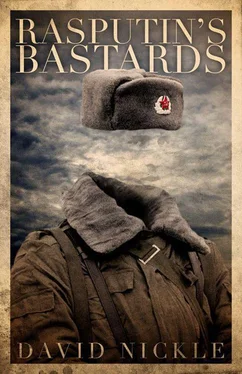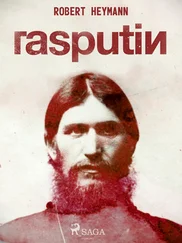“That is true,” said the Vladimir/Ilyich hybrid. “Just like your own skin, you are so accustomed to it that you do not even know when you are in it. And that is why you must acclimatize yourself. So that you may take control of matters and defeat your programming.”
Alexei frowned. “My programming? What is my programming? I don’t have any programming. Do I?”
“What did you spend the last few months doing?”
“I was working with Wolfe-Jordan,” said Alexei. “A bodyguard for Mrs. Kontos-Wu, who is an investment banker for one of the company’s mutual funds. We travelled the world. I — I failed to protect her.”
“Tragic. Also a lie. You travelled around the world all right — but not protecting Mrs. Kontos-Wu, which is not her real name. You were — you were there for another purpose.”
Alexei swallowed and thought about that.
“What about before that?” demanded Vladimir.
“I was in Belarus,” said Alexei. “I — worked for a guy.”
“Worked for a guy. “ Vladimir smirked. “Great. What before that?”
Alexei smiled back. “I worked for the KGB as an agent. In—” Alexei thought about it. All he could conjure at first were names of places — Berlin and Paris and Kowloon. But they didn’t seem right, quite. Finally, he settled on a memory — a convoy of trucks, pushing through mountainous desert while the sound of mortar fire thumped in the distance. “Afghanistan? Is that a lie too?”
“I’m not going to tell you everything,” said Vladimir. “That would only be more programming layered on other programming, and in such a way you would never regain your senses.”
Alexei’s boy mouth opened and closed and opened again. He’d been spun around enough times that he couldn’t even frame the next question.
“Okay,” said Vladimir/Ilyich. “Just one more thing to help you along the way.” He made a beckoning motion with his forefinger. Alexei leaned forward.
“Ilyich here did not die in Afghanistan.”
“That is what I remember.”
“Well he is very well. I saw him just the other day.”
“Funny joke,” said Alexei, but Vladimir/Ilyich didn’t so much as smile.
“Your understanding of your entire life until now is an immense tapestry of a lie — sewn from many small truths,” said Vladimir/Ilyich. “You must spend the rest of your life tearing this lie to pieces and putting it back together. Only then will you find the truth. Play cards until you’re ready to start work.”
When he was finished, Vladimir/Ilyich looked away for an instant. When he looked back, his eyes had changed — they were returned to a perfect copy of Alexei’s memory of Ilyich Chenko, in the smallest of details. Ilyich fanned the deck of cards in his hands.
“So are we playing, Kilodovich? Or are you going to just sit there mooning at me all morning like some queer boy?”
Alexei started to reach for the cards, then withdrew his hands.
“No cards today, Ilyich,” he said. “I remembered something inside. I’ll see you later.”
And with that, Alexei turned and headed to the low buildings to the south.
Fyodor Kolyokov had never met his real father but he had over the years found a surrogate: Ari Krieghoff, an old Nazi physician who showed up at City 512 after the War, on the lam from the Allied prosecutors and his own betrayed comrades.
Krieghoff was a rotten surrogate — he was a cold bastard when sober — and when he drank too much, he was prone to catastrophic tantrums.
And drunk or sober, Krieghoff liked little boys altogether too much. He had kept trying to feel Kolyokov up in the guise of examinations, and in the dark corners of his mind he plotted far worse intrusions. Eventually Kolyokov would decide enough was enough and orchestrate the old man’s death.
Really, Kolyokov’s years with Doctor Krieghoff were nothing to get misty about. But, Kolyokov mused, one should never underestimate the power of nostalgia. For Ari Krieghoff sat across the table from him now, in a metaphor he had apparently constructed for himself to resemble the old City 512 testing room where the two of them had spent so much time.
Kolyokov was little again — or littler, anyway — and Krieghoff was his old self; whitening hair combed back from a broad forehead, his congenital harelip hidden from the eugenics-mad Reich by a long, bristled moustache.
Krieghoff had a stack of cards in front of him, and he sent a pale, narrow tongue across his malformed lips as he drew one. He looked at it briefly, then looked at Kolyokov. “Well, boy?”
Kolyokov sighed, and turned his attention to the old man’s forehead. “Circle,” said Kolyokov. “Underneath it, a wavy line.”
Krieghoff smiled slightly and shook his head. He scratched a notation on the clipboard by his other hand, and drew another card.
Kolyokov concentrated.
“Square. Circle underneath this time.”
Krieghoff raised an eyebrow. “ Nein ,” he said and made another mark on the paper.
Kolyokov frowned: this metaphor didn’t jibe with what he knew to be true. He’d scored perfect on the card tests from the first day he began working with Herr Doktor Krieghoff. Nazi draws a circle, little Fyodor says circle; Nazi pulls out a triangle, little Fyodor sees a triangle in his mind. And even the tricky ones: Nazi draws a wavy line, thinks “Circle! Circle!” Little Fyodor Kolyokov says, “You’re thinking circle, but you’re looking at a wavy line.”
“Bullshit,” said Kolyokov now. “There’s a square with a circle underneath it.”
Krieghoff let the trace of a grin emerge from beneath his moustache. “Bullshit yourself,” he said, and turned over the card. It was a star, unmistakably. “Are you feeling well today, little Fyodor?”
“I’m fine,” said Kolyokov stiffly. If he remembered the tests going differently, there was nothing changed in the look of the old man’s eyes today that was any more or less than the lecherous evil he’d spied sixty years ago. “Let’s continue,” said Kolyokov.
Herr Doktor Krieghoff nodded — a little disappointed? Kolyokov couldn’t tell for sure. “Another card, then,” said Krieghoff, and drew from the deck.
Kolyokov redoubled his concentration. The last couple of attempts, he had been confusing imagination with true sight: a common early mistake, he supposed — although not one that he ever recalled making.
But who could say where memory was concerned?
So when his imagination conjured up a square, Kolyokov pushed it aside and continued his push. He felt sweat gather in his armpits, bead at the end of his nose. He screwed his eyes shut, and his breath was forced and ragged in his throat.
“Fyodor,” said Krieghoff pleasantly, “are you trying to read my mind, or take a shit?”
Kolyokov opened his eyes and glared across the table. The extent of the old Nazi’s harelip was revealed grotesquely in his broadening grin.
“It is a square,” said Krieghoff. He drew another line on his chart, and pushed his chair back. “That is enough for today, I think,” he said as he stood.
“Fuck,” said Kolyokov. “This isn’t right.”
Herr Doktor Krieghoff walked around the table behind Kolyokov, and leaned against the door.
“The test is over,” said Krieghoff. “Now, you know what it’s time for.”
Kolyokov felt a premonitory sinking in his stomach. He turned around, to see Krieghoff fiddling with his belt.
Kolyokov got up, and rushed around to the far side of the table. This, precisely, had never happened — Kolyokov was as sure of that as he was of anything. Krieghoff had thought about it enough — Krieghoff’s fantasies about Kolyokov and some of the other boys were an open book to little mind-reading Fyodor Kolyokov — but the Nazi understood too well what would have happened to him had he dallied with any of City 512’s young subjects directly, and had accordingly limited himself to only marginally limited “examinations.” The fear of Stalin and his minions that had kept him at bay had only started to dissolve later on. Kolyokov had taken care of Ari Krieghoff before there was a real danger of him doing any serious damage.
Читать дальше












